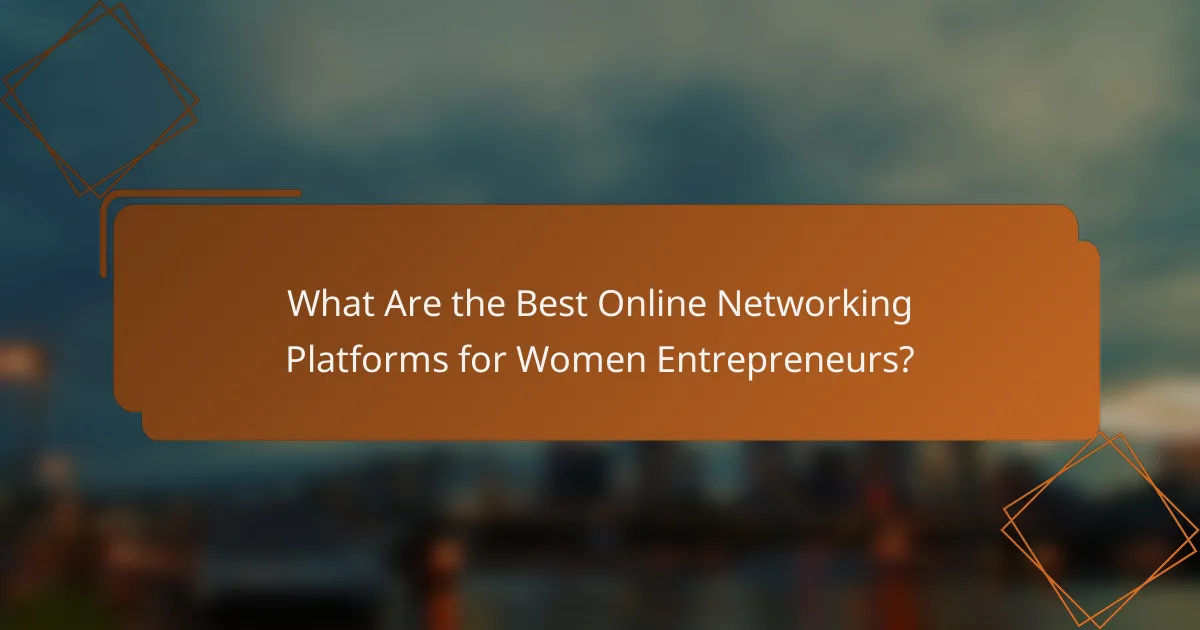In emerging markets, effective networking is essential for women entrepreneurs seeking to grow their businesses and create impactful connections. By building local partnerships, leveraging online platforms, and participating in industry events, these entrepreneurs can enhance their visibility and foster collaboration. Overcoming cultural and resource barriers through strategic networking approaches can lead to significant opportunities for growth and development.

What Are Effective Networking Strategies for Women Entrepreneurs in Emerging Markets?
Effective networking strategies for women entrepreneurs in emerging markets include building local partnerships, leveraging online platforms, participating in industry events, utilizing mentorship programs, and engaging in community initiatives. These approaches help to foster connections, enhance visibility, and create opportunities for collaboration and growth.
Building Local Partnerships
Establishing local partnerships is crucial for women entrepreneurs in emerging markets. Collaborating with local businesses can provide access to resources, knowledge, and networks that are essential for success. Consider forming alliances with complementary businesses to share customer bases and enhance service offerings.
When building partnerships, focus on mutual benefits and clear communication. Attend local business meetings or community gatherings to identify potential partners and discuss how you can work together effectively. This strategy can lead to increased credibility and trust within the local market.
Leveraging Online Platforms
Online platforms are powerful tools for networking, especially in emerging markets where digital connectivity is growing. Utilize social media networks like LinkedIn, Facebook, and Instagram to connect with other entrepreneurs, share insights, and showcase your business. These platforms can help you reach a wider audience and attract potential clients or collaborators.
Join online forums and groups that cater to women entrepreneurs to gain support and share experiences. Regularly engage with your network by commenting on posts, sharing relevant content, and participating in discussions to maintain visibility and strengthen relationships.
Participating in Industry Events
Attending industry events is an effective way to network with peers and industry leaders. Look for conferences, trade shows, and workshops relevant to your field, as these gatherings provide opportunities to meet potential partners, clients, and mentors. Prepare to introduce yourself and your business succinctly to make a lasting impression.
Consider speaking at events or participating in panel discussions to establish yourself as an expert. This visibility can enhance your credibility and attract new connections. Always follow up with contacts made at these events to nurture relationships and explore collaboration opportunities.
Utilizing Mentorship Programs
Mentorship programs can provide invaluable guidance and support for women entrepreneurs. Seek out mentors who have experience in your industry or have successfully navigated similar challenges. A mentor can offer insights, advice, and connections that can significantly impact your business growth.
Many organizations and associations offer formal mentorship programs. Look for local initiatives or online platforms that connect entrepreneurs with mentors. Be proactive in your approach, and be open to feedback and learning from your mentor’s experiences.
Engaging in Community Initiatives
Engaging in community initiatives can enhance your visibility and establish your business as a trusted local entity. Participate in local events, sponsor community activities, or volunteer your time and resources to causes that resonate with your values. This involvement can lead to meaningful connections and potential business opportunities.
Consider collaborating with local NGOs or community groups to address social issues while promoting your business. This dual approach can strengthen your network and demonstrate your commitment to the community, which can resonate well with local customers and partners.

How Can Women Entrepreneurs Overcome Networking Barriers?
Women entrepreneurs can overcome networking barriers by actively seeking opportunities and leveraging available resources. Building strong connections often requires strategic approaches that address cultural, resource, and confidence challenges.
Addressing Cultural Challenges
Cultural norms can significantly impact networking opportunities for women in emerging markets. Understanding local customs and expectations is crucial; for instance, in some regions, women may face restrictions on attending mixed-gender events. Adapting to these cultural contexts can involve participating in women-only networks or community gatherings that foster supportive environments.
Engaging with local organizations that promote women’s entrepreneurship can also help navigate cultural barriers. These organizations often provide platforms for women to connect, share experiences, and collaborate on projects, thus enhancing visibility and acceptance in the business community.
Accessing Resources and Training
Access to resources and training is vital for women entrepreneurs looking to expand their networks. Many emerging markets offer programs aimed at empowering women through workshops, mentorship, and funding opportunities. Identifying and utilizing these resources can provide essential skills and knowledge to enhance networking capabilities.
Online platforms and local business associations often provide valuable training sessions on effective networking strategies. Women should actively seek out these opportunities, as they can lead to connections with influential figures and potential partners in their industries.
Building Confidence and Skills
Confidence is a key factor in successful networking. Women entrepreneurs can build their confidence by practicing communication skills and engaging in public speaking opportunities. Joining local clubs or organizations can provide a supportive environment to develop these skills.
Setting specific networking goals can also help women track their progress and stay motivated. For example, aiming to attend a certain number of networking events each month or connecting with a set number of new contacts can create a structured approach to building a robust professional network.

What Role Do Networking Events Play in Business Growth?
Networking events are crucial for business growth, especially for women entrepreneurs in emerging markets. They provide a platform for building relationships, sharing resources, and fostering collaboration that can lead to new opportunities and increased visibility.
Opportunities for Collaboration
Networking events create numerous opportunities for collaboration among women entrepreneurs. By connecting with like-minded individuals, entrepreneurs can form partnerships that leverage each other’s strengths and resources. This can lead to joint ventures, co-marketing efforts, or even shared office spaces.
To maximize collaboration, consider attending events that align with your industry or interests. Engaging in workshops or panel discussions can also facilitate deeper connections and collaborative projects.
Access to Funding Sources
Networking events often provide access to potential funding sources, including investors and grant opportunities. Women entrepreneurs can meet venture capitalists and angel investors who are specifically interested in supporting female-led businesses. This direct interaction can significantly enhance the chances of securing funding.
When attending these events, prepare a concise pitch that highlights your business’s unique value proposition. Be ready to discuss your financial needs and how the funding will be utilized to grow your business.
Exposure to Industry Leaders
Networking events offer valuable exposure to industry leaders who can provide insights and mentorship. Meeting established professionals can open doors to new business opportunities and enhance your credibility in the market. Engaging with these leaders can also lead to invitations for speaking engagements or participation in high-profile projects.
To make the most of this exposure, approach industry leaders with thoughtful questions and express genuine interest in their work. Building a rapport can lead to lasting professional relationships that benefit your business in the long run.

What Are the Best Online Networking Platforms for Women Entrepreneurs?
The best online networking platforms for women entrepreneurs include LinkedIn, Facebook Groups, and Meetup. These platforms facilitate professional connections, community support, and local networking events, respectively, helping women build valuable relationships in emerging markets.
LinkedIn for Professional Connections
LinkedIn is a premier platform for women entrepreneurs to connect with industry professionals and potential clients. It allows users to showcase their skills, share insights, and engage with relevant content, making it easier to establish credibility and attract opportunities.
To maximize your LinkedIn presence, ensure your profile is complete with a professional photo, a compelling summary, and detailed work experiences. Regularly post updates and engage with others’ content to enhance visibility and foster connections.
Facebook Groups for Community Support
Facebook Groups provide a space for women entrepreneurs to share experiences, seek advice, and offer support. These groups often focus on specific industries or interests, creating a sense of community among members.
Joining relevant groups can lead to valuable networking opportunities. Actively participate by asking questions, sharing resources, and connecting with other members to build relationships that can benefit your business.
Meetup for Local Networking Events
Meetup is an excellent platform for finding local networking events tailored to women entrepreneurs. It allows users to discover and join groups that align with their professional interests, facilitating face-to-face interactions.
To leverage Meetup effectively, search for groups in your area that focus on entrepreneurship or your specific industry. Attend events regularly to expand your network and gain insights from fellow entrepreneurs in your community.

What Criteria Should Women Entrepreneurs Consider When Choosing Networking Opportunities?
Women entrepreneurs should evaluate networking opportunities based on their alignment with business objectives, potential for collaborative ventures, and the degree of accessibility and inclusivity offered. These criteria ensure that the chosen networking environments effectively support growth and foster meaningful connections.
Relevance to Business Goals
When selecting networking opportunities, women entrepreneurs must consider how these events align with their specific business goals. For instance, if the aim is to expand into new markets, attending industry-specific conferences or trade shows can provide valuable insights and contacts.
Additionally, entrepreneurs should assess whether the networking opportunity attracts participants who share similar objectives or target audiences. This relevance can significantly enhance the potential for fruitful discussions and partnerships.
Potential for Collaboration
Identifying opportunities that foster collaboration is crucial for women entrepreneurs. Look for networking events that encourage group activities, workshops, or panel discussions, as these formats often lead to shared ideas and potential partnerships.
Moreover, consider the diversity of participants. Engaging with individuals from various backgrounds can open doors to innovative collaborations that may not arise in more homogeneous settings. Aim for networks that promote cross-industry interactions to broaden collaborative prospects.
Accessibility and Inclusivity
Accessibility and inclusivity are vital factors when choosing networking opportunities. Women entrepreneurs should seek events that are physically accessible, offer virtual participation options, and are held in locations that are convenient for a diverse group of attendees.
Additionally, evaluate the inclusivity of the networking environment. Look for organizations that actively promote diversity and provide support for underrepresented groups. This can enhance the networking experience and ensure that all voices are heard and valued.
